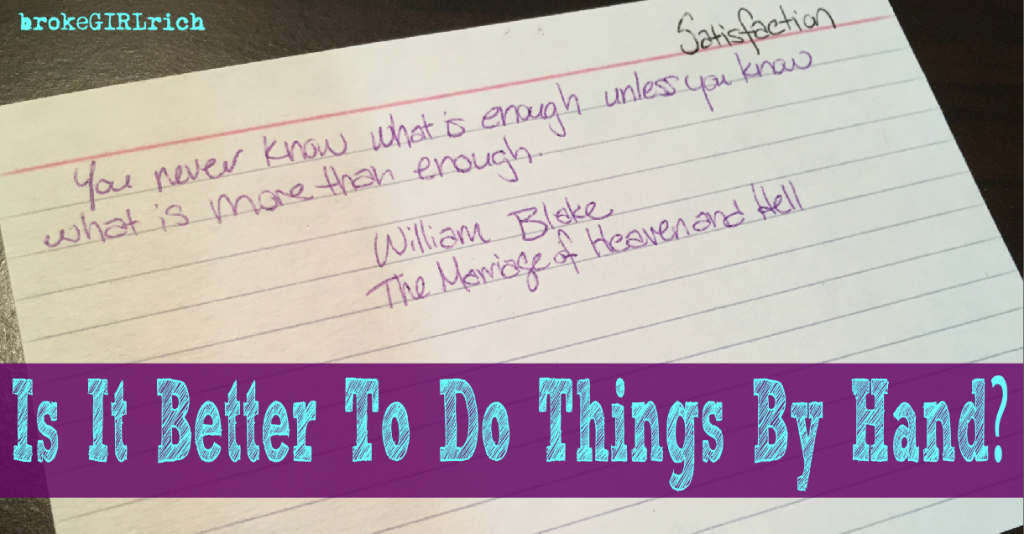
Is It Better To Do Things By Hand? | brokeGIRLrich
This past week I’ve been working on an ESL Certification so I can work for iTutor. I passed their interview process and am conditionally accepted as long as I get that certificate.
A lot of studying for the course has been common sense things or just learning the right name for a teaching theory, but a solid half of the course is English grammar.
I can see why this might make some people want to just up and walk away. I have a literature degree and even I deep sighed when I saw that.
When I was in college working on that degree, the one course that made people rethink whether or not lit was for them was the grammar class. Everyone talked about how hard it was. Everyone seemed to dread it.
I destroyed that class with no effort. See, I lucked out and had an incredibly tough teacher for both seventh and eighth grade who drilled those rules into us. I never fully appreciated her until I took that class and realized how incredibly valuable those two hard years were. Which has nothing to do with this story really and is just a shoutout to an incredible teacher, thanks, Ms. Seaman.
Well, needless to say, it’s been a hot second since I’ve thought about verb tenses, sentence structure and exactly what a gerund is.
And a lot of my studying these days is just screen shots or reading a digital book and drawing a highlighter across the important lines, but there were several warnings about the fact that passing this grammar test is the actual difficult part of the course.
So I busted out my trusty notecard and like it was 1997, I made flashcards. I physically copied down what the digital textbook had in front of me.
And I felt myself taking in the information in an entirely different way than typing any notes or (even more laughable) highlighting a in a digital book has ever done for me.
I nailed that exam. I missed one question.
Because when I have to physically write something down, I retain it so much better.
I subscribe to the Apex Money mailing list, which is a collection of articles each day about life, money, happiness, sometimes some really strange stuff, etc. and back in August, I was intrigued by a post called How and Why to Keep a “Commonplace Book.”
A Commonplace Book is a place where you keep thoughts, quotes, anecdotes, ideas, etc. I never knew this actually had a name before. A Commonplace Book (which could actually be any kind of organizing system), is how you keep them organized. I was interested to learn a lot of the most educated people, deepest thinkers, and prolific speakers all seemed to keep one through history. Also a lot of everyday people – and a lot of our knowledge of history comes from those everyday people’s diaries and scribbled thoughts.
The trick to a really useful Commonplace Book though is to physically take the time to write down these things. Again, emphasizing that the effort to do things manually rather than the copy and paste short cuts we all mostly live by these days does make a difference.
But how does this relate to personal finance and why am I rambling about grammar tests and Commonplace Books?
Every month I do a net worth update.
There are some great automatic tracking websites out there like Mint and Personal Capital. They automate this stuff for you and let you pop in to check how you’re doing at any time.
And they’re very useful tools. I have a Mint account. I think if I ever got married, a super easy way to be transparent but still have your “own” money is to just list all your accounts together on a site like Mint or Personal Capital, and both of you can log in to check out what’s up any time you want.
But that aside (and it’s not like I have any clue or real interest about marriage anyway), I still use a boring old Excel spreadsheet every month and manually go in and check each account. I physically count the cash in my wallet.
I takes me about 2-3 hours each month to work on that net worth update post, which involves updating that Excel sheet and categorizing my expenses (which Mint would also do fairly accurately for me).
The time I take to manually track my net worth has really made a huge difference in the way I think about it, mentally track it, and even my level of commitment to working on improving it.
I sort of wonder if this is why so many people succeed using cash versus credit cards. It feels like a similar mental boost (though as we all know, I am pro-credit card and all about those reward points). I know that when I hand over cash for something, I definitely feel the cost a bit more than any time I hand over a credit card.
I know we try to streamline and optimize our time spent on everything these days, but it feels like that might not always be the best approach. A slower method, with more time to think about exactly what we’re doing, can be really helpful sometimes.




Heavens no. If it isn’t stored in my smart phone it isn’t real. I’ve got one I can write notes on with the stylus, it’s all I need. If I write it on paper then it isn’t always with me when I might need it. But I firmly believe we all have different ways of learning and growing, plus you are normal and I’m an engineer.
Steveark recently posted…So, You Want a Raise?
Haha, maybe. Engineers have always seemed a little odd to me 🙂